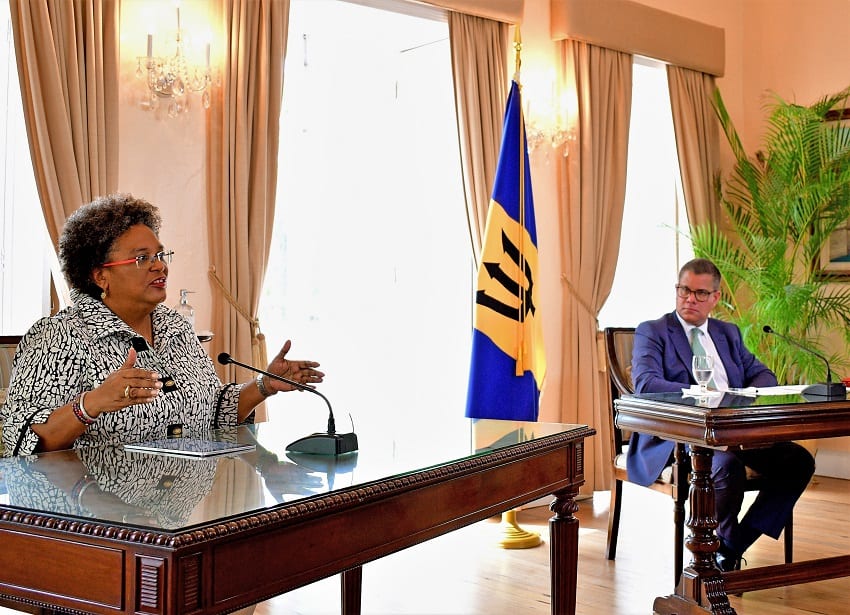Barbados has settled on its updated Nationally Determined Contributions (NDCs), as required of signatories to the Paris Agreement, and they are now to be submitted.
Prime Minister Mia Amor Mottley made the announcement today, during a joint press conference with President-designate of the 26th United Nations Climate Change Conference (COP26), Alok Sharma, at Ilaro Court.
The NDCs represent efforts by each country to reduce national emissions and adapt to the impacts of climate change.
Ms. Mottley highlighted the target of a fossil fuel free economy by 2030 as one such initiative, but noted that it would be reviewed because of the exogenous shocks.
She continued: “We have set, of course, the aspirational target of a fossil-fuel free economy by 2030. In these initial NDCs, we recognise that we can get there with a reduction of 70 per cent of what we want.
“We recognise that we are going to have to work further, and in 2025 see whether we can hold to that 2030 target of 100 per cent fossil fuel free, or whether we will have to adjust it thereafter again.”
The Prime Minister highlighted some of the other NDCs as:
- Reducing the emissions from 7.7 tonnes per year per person, to 2.3 tonnes. The global average is 8.8 tonnes per person per year.
- An unconditional commitment to a fossil-fuel free electricity sector and transport by 2030.
- An unconditional commitment of 20 per cent reduction relative to business as usual emissions in 2025, without international support.
- A 35 per cent reduction relative to business as usual emissions in 2025, but conditional on international support.
- An unconditional 35 per cent reduction relative to business as usual emissions in 2030, without international support.
- A 70 per cent reduction relative to business as usual emissions in 2030; that is conditional upon international support.

Ms. Mottley said a review would have to be undertaken with respect to other aspects related to industrial development and agriculture.
“But I’m confident that within the next three years, through both technical assistance as well as our own re-engineering of some of the ways in which we do things, that we will be able to expand that ambition the next time we look at it in 2025,” she stated.
She underscored the importance of the Roofs to Reefs Programme, saying it was absolutely essential.
In outlining some of the NDCs, the Prime Minister said Barbados was prepared to act and not just talk. She stressed that it was necessary for the global community, including the G20 countries, to recognise this climate crisis battle could not be won singularly.
“But it requires the global commitment, and that includes the large G20 countries whose actions will actually have a significant impact on the reduction of the greenhouse gases that we want to see globally,” she stated.
Ms. Mottley said there needed to be greater emphasis on funding for adaptation, while still focusing on mitigation.
She added that there was also a need for more grant funds because loans would only increase the small island developing states’ debt to GDP ratio, and make it more difficult for them to pursue the Sustainable Development Goals.
She thanked Mr. Sharma for visiting the region ahead of COP26, to be held in Glasgow later this year, saying the visit was a genuine recognition that small island developing states were on the frontline.
“I want to thank you for that sensitivity, because it is so easy to talk about us rather than to engage with us, and you have shown that you are seriously interested in how we can manage our way through these difficult times, by engaging directly with us,” she noted.
